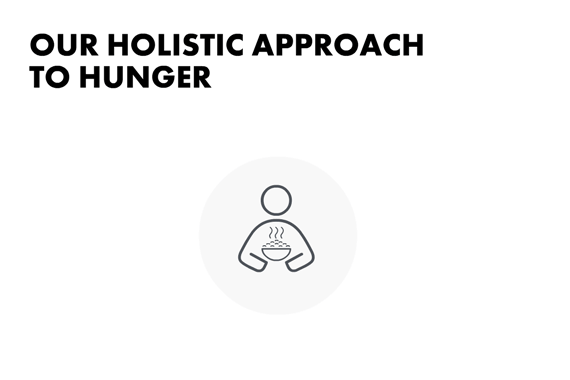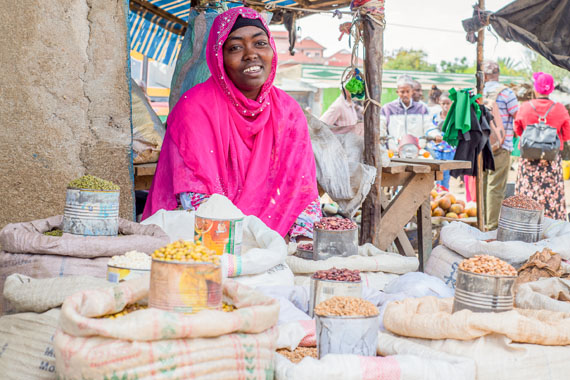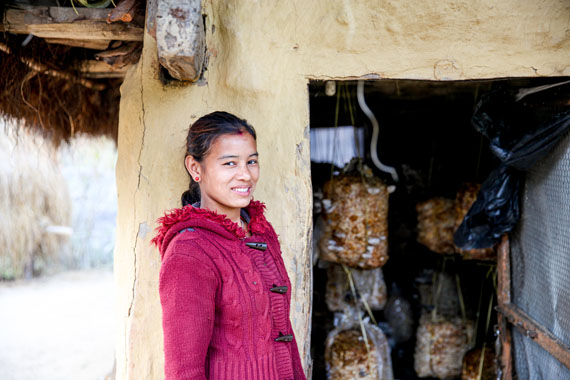
Recent months have revealed how COVID-19 threatens more than our physical health. From the global economy to our personal interactions, nothing remains untouched. For 821+ million people worldwide currently at risk of going hungry, COVID-19 has pushed already fragile food security to the brink. Get the facts on global hunger. This complex problem requires a holistic approach — a cycle of solutions that can help break the cycle of hunger. 
When Mercy Corps global teams work with families and communities facing hunger, we address both short-term needs and long-term solutions for a more sustainable approach. This includes: AGRICULTURE By connecting farmers to the resources needed to grow healthy, diverse, plentiful crops, we help them increase income and stability from season to season. HEALTH & NUTRITION Access to clean water, hygiene and nutrition education are key. Our COVID-19 response worldwide includes desalinating water in The Bahamas, providing hygiene kits in Indonesia and disease prevention education in Syria. All help decrease negative physical, economic and social impacts of the pandemic — and of hunger. WOMEN’S EMPOWERMENT By supporting women’s independence and income-earning potential, those most affected by food insecurity can become the problem-solvers. Meet Fatuma. She already had an entrepreneurial mindset. Training helped her become a provider. "Knowledge is very important, so I sought any opportunity to find ways to develop and grow," 18-year-old Fatuma reflects. 
At a market bordering Kenya and Ethiopia, Fatuma lays out sacks of maize, lentils, and sesame to sell. (© David Mutua/ACDIVOCA and USAID)
When Fatuma signed up for Mercy Corps’ GIRL (Girls Improving Resilience Through Livelihoods) program, she began to quench her thirst for knowledge. The nine-month training and mentoring workshop equips girls ages 10–19 with life skills such as reproductive health, nutrition, financial management and business skills. Fatuma was forced to drop out of school at a young age to help her family by selling any extra produce to neighbors from her kitchen garden. But with her new business success selling cereals at the market, she’s saving money and reinvesting capital. She can support her parents and pay for her sister’s education. Meet Mansari. Mushroom cultivation helped her forge a new path. "It pains for me to think of those days when I had to crush stones all day under the heat of the sun," she recalls of the times when she earned just $4.50 per week laboring in the river banks. 
(Nepal) Mansari and the shed that holds her inventory: bags dangling from the ceiling with healthy mushrooms bursting from the sides.
Mansari took Mercy Corps’ PAHAL (Promoting Agriculture, Health and Alternative Livelihoods) mushroom cultivation course and financial literacy training. With a loan from the PAHAL-supported cooperative, she began her own business. Her latest crop sold for $121, and she now saves $14 monthly for her family. Tending to her mushrooms requires only morning and evening visits, allowing her to focus on raising her daughter. Trainings like Mercy Corps’ GIRL program in Kenya and PAHAL in Nepal serve to break the cycle of hunger — turning dreams of a better future into reality. As a member of our humanitarian community, your support and engagement make programs like these possible. Thank you. You play a role in disrupting the cycle of hunger for people worldwide. We’re grateful for your compassion and commitment. Sincerely, 
Adrienne Karecki, Mercy Corps Chief Development and Marketing Officer |
| STAY CONNECTED |
|---|
|
||||||